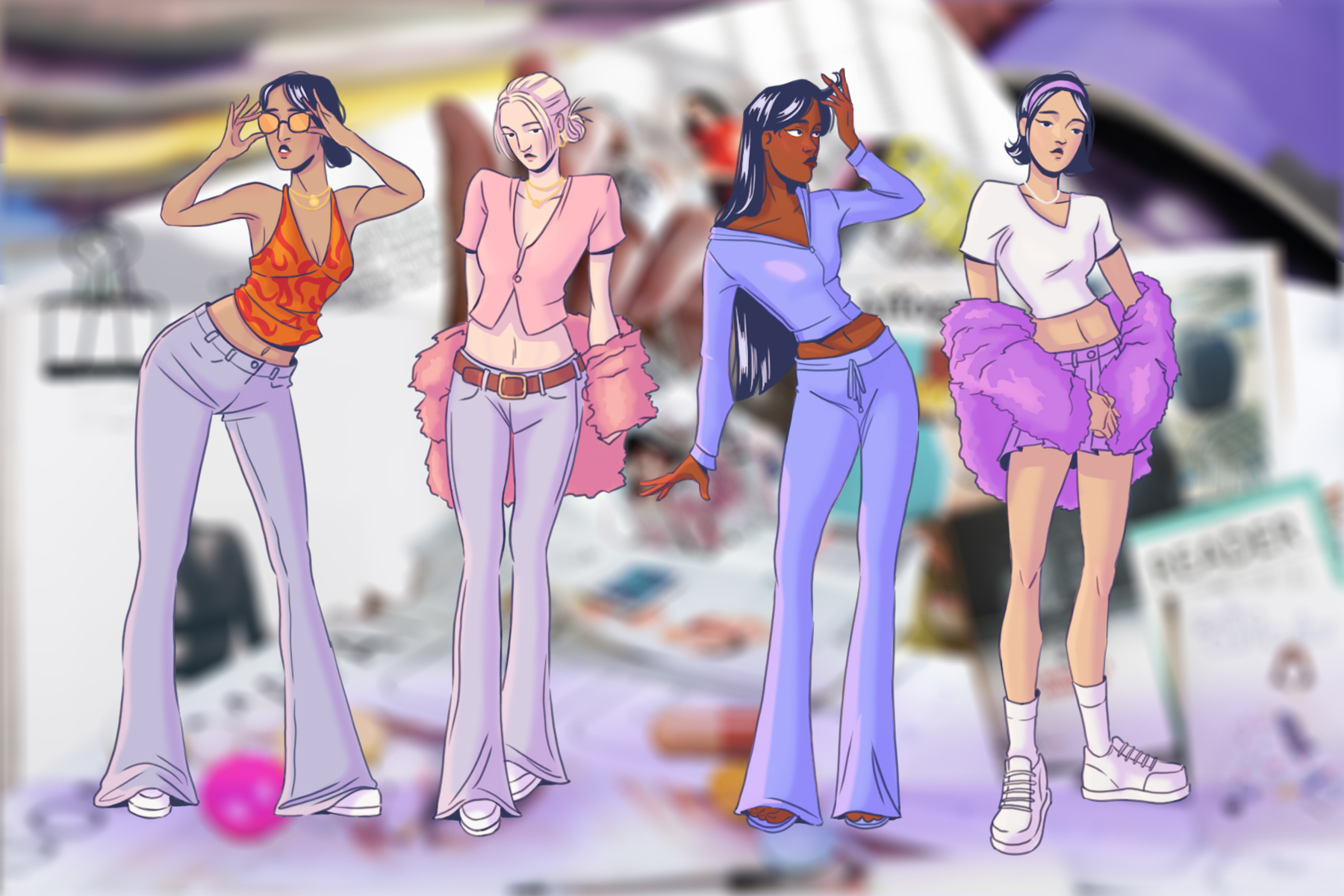From butterfly clips to velour tracksuits, Y2K fashion is coming back in a big way. Gen Zers are rediscovering the popular trends from when they were born, and for the most part, it’s a fun throwback. However, not everyone is happy about the return of this fashion era. As soon as Y2K styles started popping up on timelines, many millennials began expressing their anger. It seems like Y2K fashion has cemented itself as the next major flashpoint in the Gen Z versus millennial debate.
At first, Gen Zers on TikTok reacted to millennials’ backlash the same way they did with other pointless debates like the infamous “yoga pants versus flared leggings” debacle: They rolled their eyes and moved on. However, as the Y2K debate continued, the root cause seemed to be more than millennials gatekeeping their favorite chunky jewelry. Many of the ’80s and ’90s kids who grew up during the Y2K fashion era remember it much differently than Gen Zers do. For those who were children and teenagers during the early 2000s, these fashion trends represent more than clothes: They are a reminder of the toxic beauty standards that characterized the fashion industry and heavily distorted young people’s body images.
Millennial Beauty Standards
Starting in the 1990s and lasting through the early aughts, the standard for beauty was personified by the “heroin chic” aesthetic. “Heroin chic” was a term used to describe the “it” girls of the late ’90s and Y2K era. The key features of this look were angular bone structures, pale skin and above all, an extremely thin frame. The aesthetic was harmful for many reasons, but the one that seems to be the most threatening today is the unrealistic body standard it creates.
In order to keep up the aesthetic, the Y2K fashion industry thrived on fad diets, body shaming and unattainable images of perfection. And while a lot of Gen Zers are too young to remember the toxicity of this era, many millennials still struggle to recover from the unhealthy lessons that were drilled into their heads during their formative years. Creator Collin McCarthy, known online as @theprincessandthepoppers, defended millennials’ reactions in a now-viral TikTok video; in regards to the low-rise-pants-belly-button-ring combo, McCarthy said, “Your body was the fashion … you weren’t showing off what you were wearing, you were showing off your stomach.”
@theprincessandthepoppers #feminism #bodyimage #millennial #early2000sfashion #y2kfashion #genz #genzvsmillennial
The TikToker continues to point out the way that the Y2K fashion era distorted many people’s body images by convincing them that the only acceptable body type was a size 2 or smaller. “It takes a lot of rewiring to unlearn that,” he explained, outlining the lasting effects that 2000s kids and teens still feel due to the immense pressure to keep up with the Y2K look. The comments on McCarthy’s video reveal a strong agreement with his points. User @thejennoble noted, “Raise your hand if you’ve ever been personally victimized by the low rise jean,” and @curly_k8 added, “I don’t want my daughters going through that hell that I did !”
The Body Positivity Movement
Although these concerns are valid, there is one major difference between ’00s and ’20s fashion: the body positivity movement. Throughout the past decade, the body positivity movement remained a powerful force in helping people feel more comfortable in their own skin. In the early 2000s, people were trained to believe that their bodies were not good enough, that they should strive for an unachievable image of perfection. Now, the movement toward self-love has begun to show people that all bodies are acceptable and worth celebrating.
The main concern now is whether the movement toward inclusivity will mesh with the return of Y2K fashion. According to many millennials who are unhappy about this trend, the clothing was a catalyst for body shaming. But while the styles of the era did augment the unrealistic standards, the clothes themselves didn’t create an intolerant culture. The fashion that was popular in the early 2000s was worn by people who embodied the “heroin chic” aesthetic because that’s what was popular at the time. That aesthetic doesn’t exist with the same prevalence today, so the point of the clothes now is simply to express yourself and feel good.
Y2K clothes may look the same, but the people wearing them have changed. In the 2000s, fashion existed for the purpose of celebrating thin bodies and the narrow beauty standards they represented. These days, beauty is a more subjective concept. While Y2K fashion used to be centered around showing off your “perfect” body, the “perfect” body is an image that is quickly fading in today’s more inclusive environment. There’s still a long way to go in terms of body inclusivity, but people are generally more accepting of all body types now.
That’s why the return of Y2K fashion is simply the return of older clothing styles, not the return of harmful body standards. In fact, some millennials are actually excited about the revival of Y2K fashion, seeing the trend as a sort of do-over. When these styles were first in vogue, people were more focused on changing themselves to fit the clothes than on the clothes themselves. Now, in the context of a more inclusive society, the same people finally have the opportunity to concentrate on having fun and expressing themselves.
Despite concerns over the problematic culture that once surrounded Y2K fashion, we don’t live in that world anymore. Low-rise jeans are not going to undo more than 10 years of body positivity and magically transport us back to the time when prominent hip bones were considered haute couture. Fashion trends come and go, but the movement toward acceptance and celebration of all bodies is not going anywhere. Now that these fun styles are coming back around, we finally have a chance to let the clothes be clothes and nothing more.
















